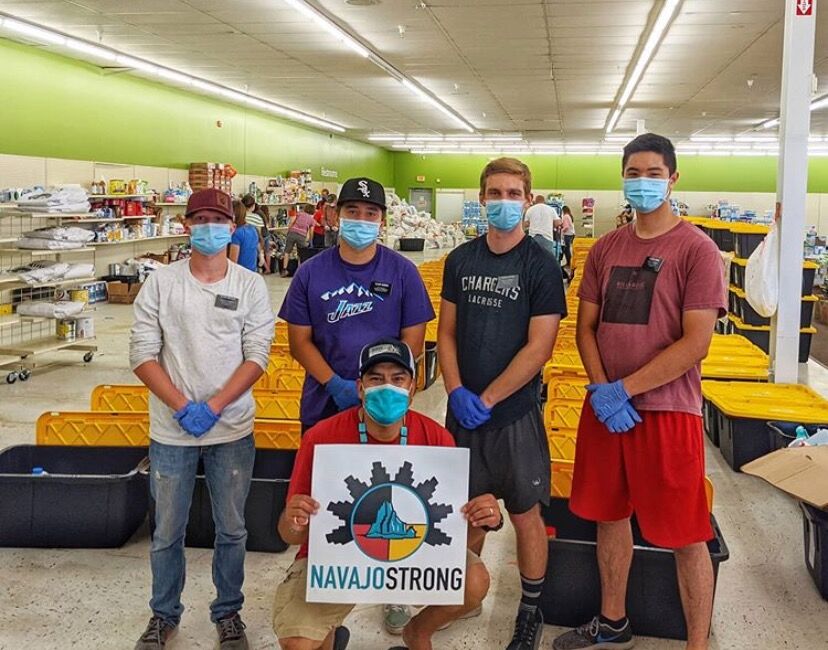Some information may be outdated.
Street addresses are rare on the Navajo Nation. Since most residents live off of the main roads, visitors usually follow directions based on mile markers or the surrounding desert landscape to find where they’re going, whether the destination is a modern home or a traditional hogan.
When Bud Frazier, founder of nonprofit NavajoStrong, was delivering COVID-19 relief supplies on the reservation in April, he followed such traditional directions. After six long hours of dropping off bins full of toilet paper, non-perishable foods, bottled water, hand sanitizer and other essentials to those in need, he couldn’t find the home of his last recipient.
“Can you meet us somewhere?” Frazier texted them.
“Sorry,” came the recipient’s reply. “I’m on my horse herding sheep.”
These long days, scheduling snafus and other difficulties associated with delivering much-needed supplies in the community hardest-hit by the deadly global pandemic are all in a day’s work for Frazier.
“I’ve learned a lot about my culture, traditional Navajo ways and how resilient we are,” he said of the experience. “The best part has been realizing where I came from and who my people are.”
After COVID-19 stole the lives of his aunt and uncle who lived on the Navajo Nation, Frazier saw the need for help not only in his own family but on the reservation as a whole.
The organization has grown significantly from operating out of Frazier’s garage in April, having amassed nearly 5,000 followers on Instagram and completed over 800 requests for supplies.
At their home facility in Blanding, Utah, volunteers — who sign up on the website given their availability — package supplies to be driven out onto the reservation. NavajoStrong has provided supplies to Navajo Mountain Senior Center, the Utah Navajo Health System, Inc. and Inscription House Health Center in Utah alongside their on-the-ground relief efforts.
Running water and electricity are sparse in areas of the Navajo Nation and accessible grocery stores are few and far between. So stacks of Spam, dried potatoes, canned vegetables and nonperishables fit Tetris-like into NavajoStrong’s sanitized 27-gallon bins alongside facemasks, hand sanitizer, Lysol, hand soap and other hygiene products. Depending on the recipient, diapers and pet food might join the other items, and the organization has recently started delivering barrels of water for livestock and farming purposes.
Frazier, a nurse himself, additionally provides written education about COVID-19 and mental health to recipients in both Navajo and English.
At the start of the pandemic, Frazier rented trailers and trucks himself for the five-hour drive from his home in northern Utah to the reservation every other weekend. But as the nonprofit gained exposure, other organizations began to pay attention. Mike Rowe, the star of television shows like “Dirty Jobs” and “Returning the Favor,” gifted a 2020 Ford F-250 truck to NavajoStrong, while others pitched in enough money for Frazier to purchase a trailer.
“We’ve been blessed to get what we need so far,” Frazier said. “Social media is just kind of the hub where everybody connects and reaches out. It’s amazing to see how many people want to help.”
“There’s a lot of misperceptions regarding what is happening on the reservations. A lot of people, rather than sitting and waiting, reach out to nonprofit organizations like NavajoStrong,” said Meredith Little, program director for NavajoStrong, who grew up on the Navajo Nation.
Little works alongside Frazier to recruit volunteers and has started planning a youth division for high school students looking to fulfill community service hours through NavajoStrong. Though she writes grant applications and coordinates other fundraising tactics for the nonprofit, her true passion is educating non-Native Americans about life on the Navajo Nation.
“I don’t think people realize how hard it is there. We’ve had the responsibility over that land for generations,” she said. “But I don’t look at it as if we are poor. A lot of people choose to live this way on the reservation because it makes them feel whole — because of that closeness they have to their homelands and ancestors.”
Colleen Wilson, a single mother living in Greasewood, Arizona, with her seven-year-old son, received crucial supplies from NavajoStrong in August.
“When we went to make an essential run for groceries and supplies, it seemed like there was nothing,” Wilson said. She asked for help from the organization.
“I couldn’t express how thankful I was — it was that relief knowing I was going to make it to my next payday,” she said.
“Meeting up with these families and giving them their bins — that in itself is so special,” Little said. “In Navajo culture, you don’t sit back and watch other people suffer. With Western society, we’ve been conditioned to think it’s every man for himself, which is completely opposite to what Navajo culture teaches us.”
After receiving her own bin, Wilson told her coworkers about the nonprofit’s work and drove to Blanding to pick up 22 bins for her community.
“Out here on the reservation, we’re so far from everything, and there are a lot of families struggling out in the community,” she said. “It just takes one person to create something big. And once people see that you are helping, they want to be a part of that, too.”
NavajoStrong shows no signs of stopping as fall approaches, remaining committed to serving the Southwest’s Native American communities. From donating 200 backpacks packed with essential school supplies in Chinle, Arizona, to keeping their facility in Blanding stocked full, NavajoStrong renews its commitment to helping their people thrive.
“I love the name NavajoStrong because it completely encapsulates and describes us as a people and that amazing, wonderful intergenerational strength that we hold,” Little explained.
“We are strong, we are resilient, and we are going to stay here and continue to live in peace and harmony to make this world a better place,” she said.
Founder moved by COVID deaths of aunt, uncle
Appreciate the coverage? Help keep local news alive.
Chip in to support the Moab Sun News.





